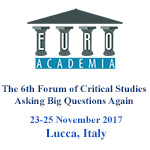Euroacademia Conferences
 Europe Inside-Out: Europe and Europeanness Exposed to Plural Observers (9th Edition) April 24 - 25, 2020
Europe Inside-Out: Europe and Europeanness Exposed to Plural Observers (9th Edition) April 24 - 25, 2020 Identities and Identifications: Politicized Uses of Collective Identities (9th Edition) June 12 - 13, 2020
Identities and Identifications: Politicized Uses of Collective Identities (9th Edition) June 12 - 13, 2020 8th Forum of Critical Studies: Asking Big Questions Again January 24 - 25, 2020
8th Forum of Critical Studies: Asking Big Questions Again January 24 - 25, 2020 Re-Inventing Eastern Europe (7th Edition) December 13 - 14, 2019
Re-Inventing Eastern Europe (7th Edition) December 13 - 14, 2019 The European Union and the Politicization of Europe (8th Edition) October 25 - 26, 2019
The European Union and the Politicization of Europe (8th Edition) October 25 - 26, 2019 Identities and Identifications: Politicized Uses of Collective Identities (8th Edition) June 28 - 29, 2019
Identities and Identifications: Politicized Uses of Collective Identities (8th Edition) June 28 - 29, 2019 The European Union and the Politicization of Europe (7th Edition) January 25 - 26, 2019
The European Union and the Politicization of Europe (7th Edition) January 25 - 26, 2019 7th Forum of Critical Studies: Asking Big Questions Again November 23 - 24, 2018
7th Forum of Critical Studies: Asking Big Questions Again November 23 - 24, 2018 Europe Inside-Out: Europe and Europeanness Exposed to Plural Observers (8th Edition) September 28 - 30, 2018
Europe Inside-Out: Europe and Europeanness Exposed to Plural Observers (8th Edition) September 28 - 30, 2018 Identities and Identifications: Politicized Uses of Collective Identities (7th Edition) June 14 - 15, 2018
Identities and Identifications: Politicized Uses of Collective Identities (7th Edition) June 14 - 15, 2018
Exoticism, Nature, and Homosexual ”Coming out”. Exile and the Establishing of New Subjectivity in the Works of Witold Gombrowicz
-
-

-
Presentation speakers
- Aleksandra Ubertowska, University of Gdańsk, Poland
Abstract:
Witold Gombrowicz is one of the most notable Polish writers of the 20th. century. His novels and diaries are characterised by abstract, eccentric irony, linguistic innovation, and an anti-nationalist and cosmopolitan attitude. Gombrowicz`s works are renowned amongst European intellectuals and his “Kosmos” won the Prix International in 1967. Gombrowicz published his first works in prewar Poland (“Memoirs of a Time of Immaturity”, “Ferdydurke”). Just before the outbreak of the WWII, Gombrowicz went on a transoceanic trip to South America on the cruise liner “Chrobry”. After hearing that his homeland had been occupied by the Nazi and Soviet armies, he decided to stay in Buenos Aires, where he lived until 1963. During this stay he worked in Banco Polaco as a clerk and lived in very humble conditions. In spite of this he succeeded in publishing many novels and fragments of his intellectual diary. He collaborated with various Argentinian intellectuals: Jorge Borges, Virginio Piniera etc. In 1963 he moved to Europe and lived in Germany and South France. His books were banned (or, after 1956, subjected to censorship) in communist countries. The thrust of my paper is an examination of how the experience of exile/migration was reflected in the diaries and novels of Witold Gombrowicz, published during his stay in Argentina. I focus on two of Gombrowicz`s strategies for coming to term with the feeling of ‘being removed’ from his home country Poland (which was subjected to extremely traumatic historical oppression: Nazi terror, holocaust, Soviet deportations): a)homosexual „coming out” (in the novels „Trans-Atlantyk” and „Pornografia”) as well as b) admiring the exotic Latin American nature („Diary Rio Parana”). Nature as non-human seems in these works to play the role of counter-narrative regarding history, establishing a different order of moral values and new, extended (non-anthropocentric) subjectivity that connects species within a set of interactions between plants, stones, climate.
-
Related Presentations

A (Really) Big Question: Which Is The Proper Political Subject?
- Carles José i Mestre

Rethinking China’s Revolutionary Identity in Transformation: Memory, Reflection, and Cultural Politics
- Mengqian Yuan
- Chu-Jie Chen

Postcolonial Art and Critical Discourses at the São Paulo Biennial
- Amélia Siegel Corrêa













